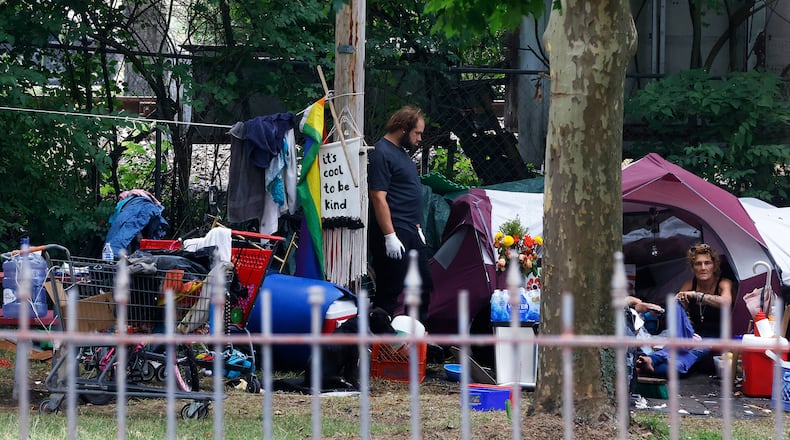Ritter said her department is in “constant contact” with Miami Valley Housing Opportunity’s street outreach team in an ongoing effort to find permanent housing for those living in the park.
The property’s owner gave individuals at the encampment until Monday to vacate the site.
As of Thursday afternoon, a Dayton Daily News visit confirmed that the tent encampment was gone from the park. City officials said they don’t believe police had to remove anyone from the site. The city memo does not say where the people relocated.
After a leader of the Wolf Creek Neighborhood Association pleaded for help from officials at a city commission meeting last week, Ritter has compiled a timeline detailing how officials have been handling the issue.
According to the memorandum, a small homeless encampment had originally been set up at the property, which is known as “Little Eden Park,” at some point last year, but individuals had dispersed by October.
In January, the city’s community engagement department began receiving complaints from the nearby Dayton Leadership Academy school reporting a new homeless encampment, with a total of around 10 individuals, had been erected at the park.
“At this time ... (Dayton Housing and Inspections) provided individuals with information for connection to Miami Valley Housing Opportunities to ensure they could start the process of moving towards permanent housing,” the memorandum states.
The school contacted the city again in May to report potential vandalism and concern for student safety, as the encampment had grown in size. According to the memorandum, the encampment had “more than doubled” since January.
“At this time, there were three abandoned properties that were still standing on Negley Place, with two of the properties appearing to have individuals staying inside,” the memo states. “Since May 2024, two of those properties have burned down and one was taken down by emergency demolition.”
The city’s human services manager then began coordinating weekly with the MVHO street outreach team to actively engage with individuals living in the camp and to assess them for housing, ultimately letting them know they needed to begin making plans to vacate the site.
“Most individuals are on waitlists for permanent supportive housing,” Ritter states in the memo. “All resources available were being exhausted, but the lack of appropriate housing options is the biggest barrier at play.”
In June, individuals voluntarily dispersed from the site and public works staff cleaned up the site, according to the memo. But this was short-lived and people soon began making their way back to the park.
The property’s owner then began working directly with the street outreach team to assist in the effort to get the individuals permanently housed, the memo adds.
However, the encampment continued to grow, which prompted the neighborhood leadership to address city commission directly on July 10, citing concerns about potential drug use and safety of children who live nearby.
About the Author


